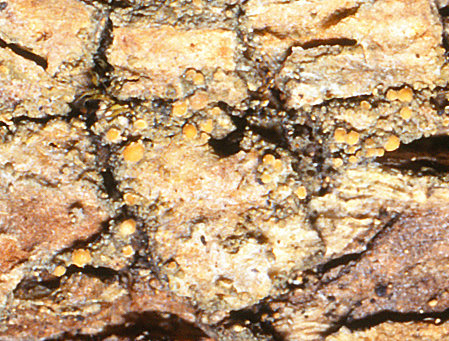Biatoridium monasteriense
B. monasteriense is a crustose epiphytic lichen with a scurfy thallus which is pale green when dry and bright green when moist. Apothecia are numerous, 0.2-0.5 mm diameter, yellowish, reddish yellow or pale pink top dull red-brown in colour, becoming translucent and paler when wet. They can be flat or convex, partly immersed in the thallus or sessile.

Photo: V. Alstrup
In the field the mealy-scurfy crustose growth form of this species, and the pale brown to yellowish or pinkish-brown fruits becoming convex, can superficially resemble some other scarce lichens, particulalry Lecania species such as L. chlorotiza, which is found in similar situations on basic bark. Microscopic examination is essential for correct determination. This need not constitute a conservation threat, as a single fruit will suffice. At x20 the dull green (when dry) flattened thalline verrucae are distinctive and recognisable with practice (but in poorly developed material these are very inconspicuous).
Confusion is also possible with the even rarer Biatoridium delitescens. That species, however, has an inapparent to finely scurfy thallus and pallid, almost white (translucent when moist) flatter apothecia, but darkening pale brown after several months in dry storage. (SPC)
| Location | Grid Reference | Last Rec'd | Recorder(s) | SSSI |
| Meirionydd: Coed Allt y Benglog NNR | SH 808 236 | 2002 | S.P. Chambers & C. Hitch | Yes |
- Read more about Biatoridium monasteriense
- Log in to post comments
